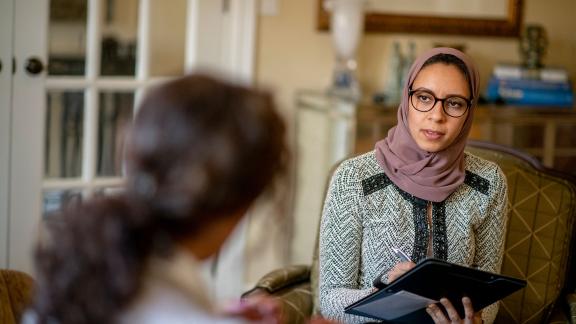Pitting patients and GPs against each other is unhelpful and dangerous

The tension between patients and GPs is creating devastating consequences. We need to shift from damaging rhetoric, learn what patients need and what primary care can safely deliver, write Victor Adebowale and Robert Francis.
People aren’t always getting the support they need from their GPs. True. GPs are working around the clock, doing everything they can in response to unprecedented levels of demand for healthcare. Also true.
These two statements are not mutually exclusive. Both accurately reflect how many patients and primary care teams feel about what is happening at the front door of the NHS in the wake of a brutal pandemic.
Yet, it is becoming increasingly evident that patients and primary care teams are being pitted against each other. This tension is then spilling over with devastating consequences, from totally unacceptable abuse against staff to some patients not seeking treatment because they are being made to feel like a burden.
The pandemic has showcased everything we should feel proud of, with health and care workers putting their wellbeing at risk to treat and support the population during the greatest crisis of our generation. But coronavirus has hit the NHS and wider society hard. An additional 10 million people are estimated to need support for their mental health, there is a backlog of 5.6 million people waiting for routine but life-improving procedures, and there are even more people in need who have not come forward. On top of that the long-term impact of the pandemic will not be known for some time but within the NHS.
Innovation in primary care
The last 18 months have seen a radical shift in how people have engaged with health and care. There has been a sudden revolution in digital access across hospitals and primary care – a holy grail, which had long been the focus of many national strategies.
94 per cent of GP practices in England inspected by the independent regulator last year were rated as either good or outstanding
For years, the NHS had been criticised for not embracing technology that was readily available at everyone else’s fingertips. The pandemic served as a vital catalyst and the NHS innovated and evolved at pace, all while maintaining standards. 94 per cent of GP practices in England inspected by the independent regulator last year were rated as either good or outstanding.
Patients at the centre of care
Initially, this shift was out of necessity so that the spread of a deadly disease could be minimised. Primary care offered more patients phone or video consultations in the first instance, rather than seeing everyone face-to-face by default.
For many people, this approach has suited their personal preferences and their clinical needs. Where working at its best it makes care more flexible, and for those with good existing relationships with their GP, we hear how things are actually better than before the pandemic. This includes people living in rural areas who no longer have to make long journeys to see the doctor for medication reviews or check-ups on chronic conditions. This is the sort of progress patients have been wanting to see for over a decade and we must not lose this.
Over 14 million appointments in July were done face to face
Clearly though this model does not suit everyone or every care need. Whether it be people with mental health conditions, people experiencing a new medical concern or those who struggle with technology, there are a multitude of reasons why remote services cannot be a default or a one size fits all approach. And that’s precisely why more than 14 million appointments in July were done face to face.
A hybrid model for primary care
But at the moment too much of the debate around the future of primary care is about what proportion of appointments should be delivered in a particular way. Often those calling for one thing or another are doing so based on limited evidence and this is not how good policy is made or how good services are designed. There are also accusations that GPs are not doing enough, when the fact is that they are doing everything they can and are seriously overstretched.
The future of primary care has to be a hybrid model where remote services provide quick and convenient access and with practices also making in-person appointments easy to request. In addition, patients need to be told how this should work in practice, so they know what to expect.
A final word
As the representative bodies for healthcare leaders and patients, we know that patients and frontline workers both want to be understood. They also want underlying barriers beyond their control to be addressed, so the NHS can consistently provide high-quality and safe healthcare that best responds to people’s needs and preferences.
The dial needs to shift from the dangerous and damaging rhetoric that has played out recently towards encouraging a fresh and calm dialogue about what patients want and need from primary care, alongside what primary care can feasibly and safely deliver. The gulf existing between the two is worrying.
Winter is coming and with that, demand for healthcare is expected to rocket even more. We need honesty about what the NHS can do and how, and for plans to be developed with full patient and frontline involvement.
Lord Victor Adebowale is chair of the NHS Confederation and Sir Robert Francis is chair of Healthwatch England. Follow them on Twitter @Voa1234 @HealthwatchE



